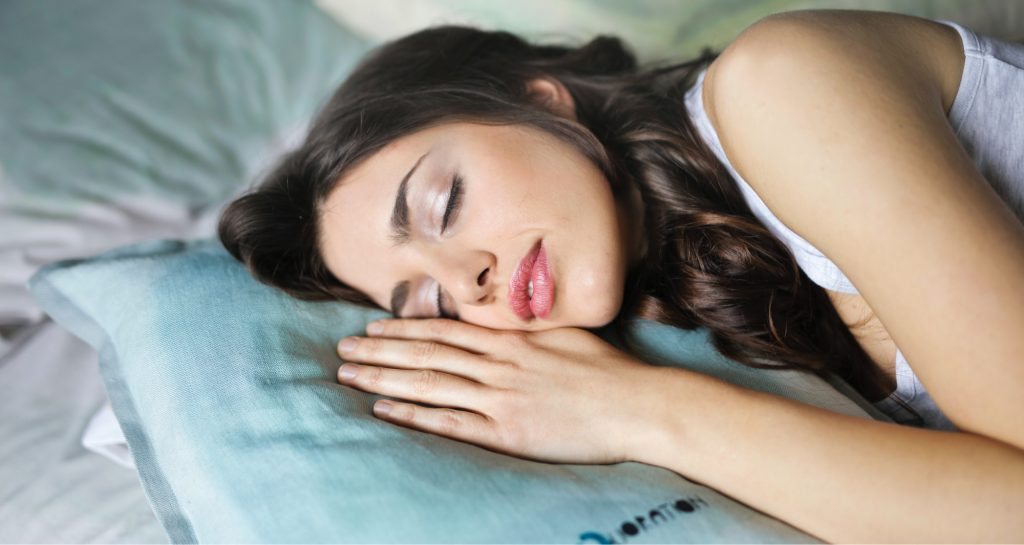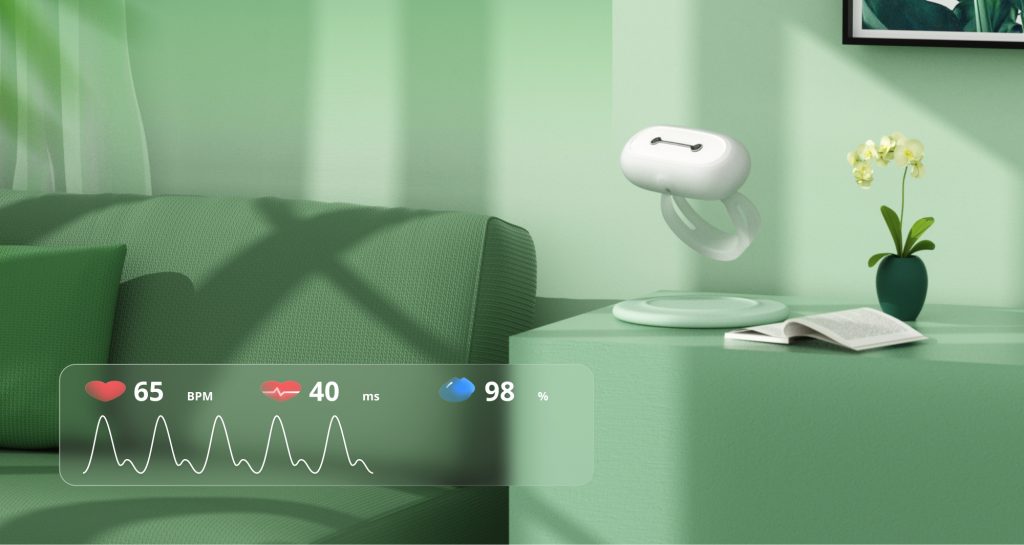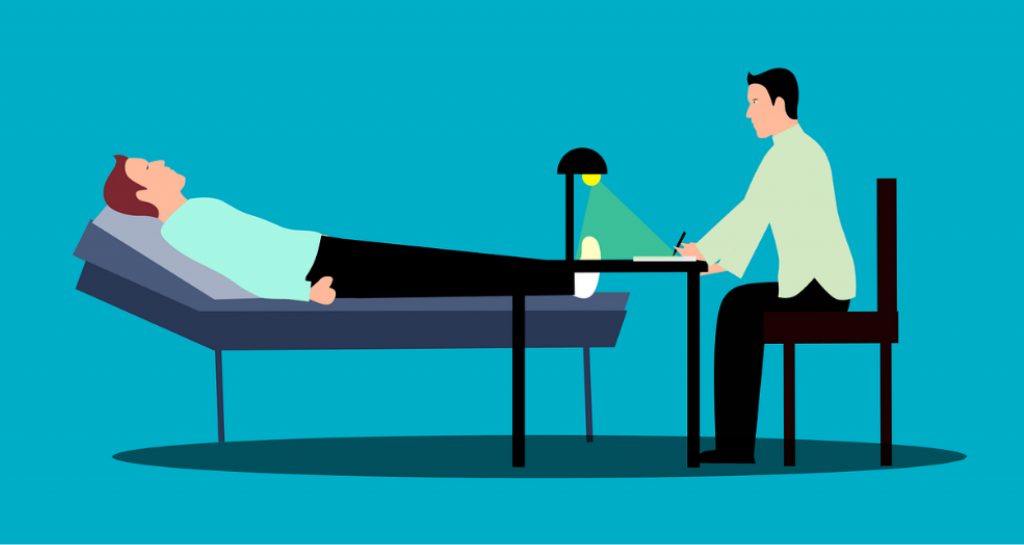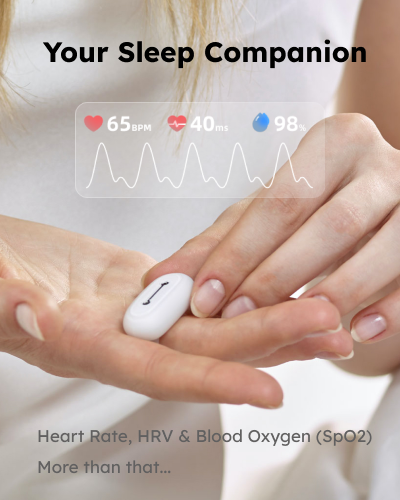What causes insomnia in females? 3 Reasons Explained with Treatment

We all know sleep is the best medicine, and we know the negative correlation between lack of sleep and mental health, and less sleep causes stress even more. But the fact is that insomnia is one of the most common sleep problems, and women are more likely to have insomnia than men.
Insomnia, which is defined as having a hard time going to sleep, waking up too early, or feeling unrested after nights of sleep, is more commonly experienced by women. Most adult women need seven or more hours of sleep to feel rested, according to the Journal of Clinical Sleep Medicine.
Now you may wonder, why more women have insomnia than men?
This article will touch on what causes insomnia in females as well as recommend some potential insomnia treatments for women.
Women are more likely to have insomnia than men
According to Office on Women’s Health, one in four women has insomnia symptoms, compared to one in seven adults in a larger base. Besides that, women are twice as likely to have insomnia as men, as indicated by Michigan Health.
Based on Sleep Foundation, up to 67% of women reported a sleeping problem4 at least a few nights during the past month, and 46% had problems almost every night.
What are the symptoms of insomnia in women?
Mayo Clinic summarizes some common symptoms of insomnia:
- Difficulty falling asleep at night
- Waking up during the night
- Waking up too early
- Not feeling well-rested after a night’s sleep
- Daytime tiredness or sleepiness
- Irritability, depression, or anxiety
- Difficulty paying attention, focusing on tasks, or remembering
- Increased errors or accidents
- Ongoing worries about sleep
In addition, women, especially older women, are more likely to have multiple symptoms of insomnia, as opposed to men who often only have one, based on the National Library of Medicine.
What causes insomnia in women?
Even though no single element explains why insomnia affects differently between men and women, various causes are combined to create more sleep challenges for women.
3 common insomnia causes in women
Hormones
- Period. Due to the strong connection between hormones and sleep, boys and girls start to show differences in sleep after puberty starts. At different times of the month, women may sleep worse than at other times because of their period. It is when progesterone levels drop and premenstrual syndrome (PMS) symptoms hit.
- Pregnancy. Based on WebMD, by the late stage of pregnancy, women’s estrogen and progesterone levels calm down that making them have physical discomfort, which leads to them staying up and not sleeping well at night.
Mood disorders
Mood disorders, such as anxiety and depression, are more likely to happen among women, which causes them to be more vulnerable to sleep problems.
That’s because many of the chemicals that are supposed to regulate your sleep in the brain can be affected by mood disorders.
Work and home responsibilities
Even though time has changed a lot, women are still more often the primary caregivers for children. Later in the life stage, women still may end up taking care of their parents or their partner’s parents.
However, at the same time, women may also work outside of the home while caregiving.
All these responsibilities may reduce their sleep time.
Other common causes of insomnia

Caffeine and alcohol intake.
Caffeine can disrupt your sleep, especially if taken within several hours before going to sleep. Alcohol, on the other hand, may make you fall asleep fast, but it can cause you to wake up too early and not be able to fall back asleep.
Poor sleep habits.
Irregular sleep schedule, long naps during the day, an uncomfortable sleep environment, and too much screen time just before bed can interfere with your healthy sleep hours.
Eating dinner too late.
Eating too late may cause you to feel physically uncomfortable while lying down. It can also lead to an upset stomach and restless sleep.
How to diagnose insomnia in women?
There is no specific way to diagnose insomnia, but you could follow these steps to diagnose insomnia:
- Keep a sleep diary. Write down your sleep routine for one to two weeks (bedtime, wake time, naps, caffeine use, etc.) like you write a diary. This information can help you or your health provider understand patterns or behaviors that interfere with rest.
- Complete a sleep study. If you decide to go to your doctor for insomnia that may be caused by sleep apnea or other sleep disorders, you may be referred to a sleep study test center.
- Get a sleep tracker. In general, a sleep study test cost can be very high so to better understand your blood oxygen during sleep, which could help you do a sleep study by yourself. Overall, it is a cheap but efficient option.

Go2sleep could be a choice if you are in need. It can track sleep data all night, and provide comprehensive sleep reports with accurate data. Besides that, it is small and light. More importantly, it can offer you the best value. Sleep Foundation named it the best value sleep tracker of 2022.
What could be the cure for insomnia in women?
Knowing some potential causes and how to diagnose your sleep problems is a good start to overcoming insomnia.
Insomnia treatment for women
Healthy Sleep Hygiene
- Reduce caffeine intake. Certain amount of caffeine is good for your health but taking too much could harm your sleep at night, so try to reduce your caffeine intake later in the day or evening when it gets closer to bedtime.
- Don’t drink too much alcohol. Alcohol consumption could throw off your sleep patterns. UC Davis Health says: “alcohol can help you fall asleep, but not necessarily stay asleep or sleep well.”
- Do some exercise. Exercise overall can reduce your stress, boost your mood, and eventually help you sleep better at night. But just remember to finish the exercise hours before bedtime to give your body time to cool down.
- Keep your bedroom cool. Studies find that between 60 and 67 degrees Fahrenheit is the best for people to fall asleep at night. Don’t forget to make your bed and pillow comfortable as well.
Healthy Sleep Habits
- Don’t nap too much during the day. Sleep Society warns if you want to take a nap during the day, don’t exceed 45 minutes because it can lead to deep sleep and interfere with your normal body clock which will alternately cause you to have a harder time falling asleep at night.
- Avoid screens before sleep. According to UC Davis Health, the blue light from cellphones, tablets, and computers signals our bodies to stay awake and not release melatonin.
Healthy Sleep Schedule
- Don’t eat dinner too late. Eating too late can lead to an upset stomach and restless sleep. Try to have dinner 4 hours before sleep time to give your body some time to digest the food since it wants to shut down all the metabolic work.
- Keep a schedule. Set the daily schedule of getting up and sleeping at the same time to keep your body clock steady so that you may find it easier to fall asleep at night. If you don’t have a healthy sleep schedule, you will be likely to have a sleep debt.
Cognitive Behavioral Therapy for Insomnia (CBTI)
If you have tried the suggested solutions above but your insomnia still has no progress, your health providers may prescribe cognitive behavioral therapy for sleep before giving you medication.

This therapy normally requires an initial evaluation, followed by weekly sessions to identify unhealthy/unhelpful thoughts that affect your sleep habits and schedule. The therapist will work with you to get rid of the negative thoughts and replace them with positive ones.
The treatment improved sleep quality for people that had trouble falling asleep, staying asleep, and waking up early. At their follow-up appointments, the individuals continued to report continued success.
One 2020 study confirmed again that the use of the CBTI program improved sleep and reduced the use of sleep medications.
For more information about CBTI, check out Mayo Clinic.
Conclusion
Sleep and wellness are always correlated in our lives, no matter if you are female or male. However, females have a higher possibility to experience insomnia than males.
This article has summarized the situation, causes, how to diagnose insomnia in women, and the cure for insomnia in women.
Despite that, proper self-diagnosis may help you understand your sleep habit and your sleep health better; and it is very convenient to get a cheap but effective sleep tracker by yourself. Then follow up with some insomnia treatment so that you can eventually overcome insomnia.
References
Insomnia is one of the most commonly reported sleep problems.
3 Reasons Women Are More Likely to Have Insomnia
What Are the Causes of Sleep Problems in Women?
Insomnia symptoms in older adults: associated factors and gender differences
COVID-19 is wrecking our sleep with coronasomnia – tips to fight back
Coronasomnia: Why You May Not Be Sleeping and What to Do About It
10 common mistakes in fighting ‘coronasomnia’ — the inability to fall and stay asleep
Insomnia in Women: Causes, Signs, and Scientifically Proven Treatment
Females and insomnia: How hormones impact sleep at every stage of life
Comments (2)
Leave a Reply Cancel reply
Recent Posts
- Black Friday Sleep Tech Mega Sale — Up to 58% OFF Smart Rings & Anti-Snoring Devices
- Finally, Sleep Naturally Again — The Mask-Free Way to Rest Better and Wake Up Refreshed
- How to Prepare Your Body Before Surgery for Better Recovery and Long-Term Success
- Stop Snoring Naturally: How MRD_M2 Helps Couples Sleep Better and Reconnect
- GO2SLEEP 3 Review: The Most Accurate Science-Backed Sleep Tracker Under $110
ALL ARTICLES
Subscribe Us
Products
Company
Copyright © SLEEPON. All rights reserved.
SLEEPON keeps both Sleeponhealth and Sleepon.us due to the brand upgrading. We promise to provide the same products and service in both sites.








I appreciate your creativity and the effort you put into every post. Keep up the great work!
Keep up the incredible work! I can’t wait to see what you write next.